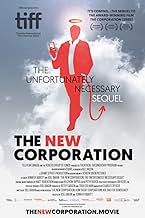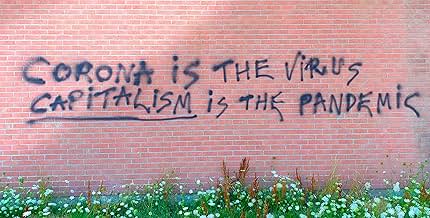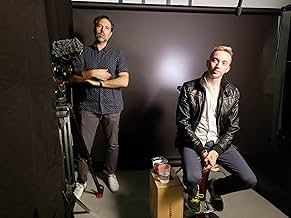The New Corporation: The Unfortunately Necessary Sequel
- 2020
- 1h 45min
CALIFICACIÓN DE IMDb
7.0/10
724
TU CALIFICACIÓN
Expone cómo las empresas están cambiando desesperadamente su marca como socialmente responsables.Expone cómo las empresas están cambiando desesperadamente su marca como socialmente responsables.Expone cómo las empresas están cambiando desesperadamente su marca como socialmente responsables.
- Dirección
- Guionista
- Elenco
- Premios
- 1 premio ganado y 8 nominaciones en total
- Dirección
- Guionista
- Todo el elenco y el equipo
- Producción, taquilla y más en IMDbPro
Opiniones destacadas
I'm amazed by the number of reviewers who were surprised to find "socialist" or "left-leaning" commentators being interviewed for this documentary--especially those reviewers who mention the original documentary favorably. Since the thesis of the documentary is (essentially) that corporations are dangerous, I'm not sure who else they expected to be interviewed. The film features some of the same interviewees from the first film: Robert Reich, Naomi Klein, Noam Chomsky, Vandana Shiva, and so on. It does also feature a couple corporate representatives, but not the number that were featured in the longer and more in-depth first documentary.
As the film indicates with clips from Margaret Thatcher, Ronald Reagan and Milton Friedman, since the 1970's, a market-based neoliberal philosophy has come to dominate political dialogue to the point that de-regulation is a central mantra of conservatives the world over (not to mention most centrist liberals). I would challenge these reviewers who demand a more "fair and balanced" presentation to scour the internet for a mainstream right-wing politician, thinker or activist that is strongly against corporate consolidation of power. You won't find one. It would be difficult, but not impossible, do do so within the mainstream centrists (Democrats in the US, or liberal parties in other countries), as well.
On the other hand, if the demand is to present these interviews alongside those who speak on behalf of the corporation, we certainly don't need further examples of that: our lives are inundated with constant pro-corporate messages, whether explicitly in advertising, or implicitly in the various privatized systems we have to navigate on an everyday basis--you are reading this review on a website that has been owned by Amazon since 1998. The pro-corporate perspective is also represented in the first film, which is more broadly about the history of corporations and their general methods of operation; this "sequel" feels more like an addendum or appendix than something to be viewed in a vacuum. In other words, if you haven't seen the first film, you should watch that first, as it is certainly still relevant and revealing.
Chris Hedges is correct that it is hard to view the complex of issues presented currently without feeling a deep sense of despair. I think that is why the second half of the film, which I see here derided by others, is both important, and ironically the subject of such angst. We are at an impasse and many of us feel powerless to counteract global forces that seem to be spiraling toward inevitable destruction. To present this documentary without some iota of hope would not only be depressing, it would be irresponsible. In the internet age, where raising someone's ire is the surest way to generate traffic, and therefore revenue, we should take at least some time to focus on the causes that bring us together, not just the ones that piss us all off.
As the film indicates with clips from Margaret Thatcher, Ronald Reagan and Milton Friedman, since the 1970's, a market-based neoliberal philosophy has come to dominate political dialogue to the point that de-regulation is a central mantra of conservatives the world over (not to mention most centrist liberals). I would challenge these reviewers who demand a more "fair and balanced" presentation to scour the internet for a mainstream right-wing politician, thinker or activist that is strongly against corporate consolidation of power. You won't find one. It would be difficult, but not impossible, do do so within the mainstream centrists (Democrats in the US, or liberal parties in other countries), as well.
On the other hand, if the demand is to present these interviews alongside those who speak on behalf of the corporation, we certainly don't need further examples of that: our lives are inundated with constant pro-corporate messages, whether explicitly in advertising, or implicitly in the various privatized systems we have to navigate on an everyday basis--you are reading this review on a website that has been owned by Amazon since 1998. The pro-corporate perspective is also represented in the first film, which is more broadly about the history of corporations and their general methods of operation; this "sequel" feels more like an addendum or appendix than something to be viewed in a vacuum. In other words, if you haven't seen the first film, you should watch that first, as it is certainly still relevant and revealing.
Chris Hedges is correct that it is hard to view the complex of issues presented currently without feeling a deep sense of despair. I think that is why the second half of the film, which I see here derided by others, is both important, and ironically the subject of such angst. We are at an impasse and many of us feel powerless to counteract global forces that seem to be spiraling toward inevitable destruction. To present this documentary without some iota of hope would not only be depressing, it would be irresponsible. In the internet age, where raising someone's ire is the surest way to generate traffic, and therefore revenue, we should take at least some time to focus on the causes that bring us together, not just the ones that piss us all off.
I don't normally write feedback on fake reviews but these are so obvious its not funny. To name democrats and in particular to call "Kshama Sawant a socialist, but an evil one at that"...... is ridiculous. A right wing opinion that brings politics into a review of a movie/documentary is not right.
Now I will watch this and review it properly.
Now I will watch this and review it properly.
If you want to now how we got here and the terrible road we're headed down, watch this. If you're blinded by ideology and don't come away with something, then you're a lost cause. If not, this should galvanize you at least somewhat.
A sequel to a 2003 documentary I first saw back in high school, the 17 years between that film and its sequel has certainly given The New Corporation a great deal of material to cover in its 106-minute runtime. It argues that corporations have become sneakier and more fake-friendly since the 2010s, seeing as tides have changed a little, and the blatant disregard for human lives isn't something they're able to get away with as easily (the 2003 original spent almost 2.5 hours diagnosing the corporation as a psychopath, or at least saying the concept of a corporation would be a psychopath if it were a person).
With a great deal of topics and issues to tackle, The New Corporation is worryingly scattershot at first. It doesn't always feel like it has much of a reason for existing in its opening scenes, and feels underwhelming and a little tired as a result. It does considerably pick up steam at a point, and thankfully became very interesting after its shaky start. It takes some complicated, difficult ideas and explains them very well; certainly in a more competent and understandable way than some YouTube videos I've seen on issues surrounding capitalism and corporate influence on politics.
I feel like it reverts to the messiness of the opening scenes in its closing scenes, unfortunately. It covers some 2020 events that are important issues, but doesn't always do the best job at linking them to issues surrounding corporations (there should be documentaries about the George Floyd protests, but maybe not this documentary - there are some loose connections to the main issues of The New Corporation, but it's not as relevant as some of the other things discussed).
It does also let a few politicians off the hook, but the fact it often comes back to "the system doesn't work; we need a new system" makes the criticisms of conservatives feel less pro-centre-left and more just against the system that lets conservative parties do damage. Others may feel differently, though; that's to be expected when politics enter into a documentary, but I don't think they could've avoided getting political altogether here.
With a great deal of topics and issues to tackle, The New Corporation is worryingly scattershot at first. It doesn't always feel like it has much of a reason for existing in its opening scenes, and feels underwhelming and a little tired as a result. It does considerably pick up steam at a point, and thankfully became very interesting after its shaky start. It takes some complicated, difficult ideas and explains them very well; certainly in a more competent and understandable way than some YouTube videos I've seen on issues surrounding capitalism and corporate influence on politics.
I feel like it reverts to the messiness of the opening scenes in its closing scenes, unfortunately. It covers some 2020 events that are important issues, but doesn't always do the best job at linking them to issues surrounding corporations (there should be documentaries about the George Floyd protests, but maybe not this documentary - there are some loose connections to the main issues of The New Corporation, but it's not as relevant as some of the other things discussed).
It does also let a few politicians off the hook, but the fact it often comes back to "the system doesn't work; we need a new system" makes the criticisms of conservatives feel less pro-centre-left and more just against the system that lets conservative parties do damage. Others may feel differently, though; that's to be expected when politics enter into a documentary, but I don't think they could've avoided getting political altogether here.
Quite an interesting documentary to watch, it does highlight the state of affairs with crony-capitalism and how it's making us point fingers at each other, rather than a bunch of massive global corporations which are reaping huge profits off the back of our taxes and simultaneously lowing our standards of living. We've been sold out by people in our governments, and will be worked to death to fund what amounts to corporate socialism.
It does lose focus at points, and repeats in a few places but overall I did enjoy watching it.
It does lose focus at points, and repeats in a few places but overall I did enjoy watching it.
¿Sabías que…?
- TriviaThis program documentary was funded by the biggest media corporation in Canada
- ConexionesFollows La corporación (2003)
Selecciones populares
Inicia sesión para calificar y agrega a la lista de videos para obtener recomendaciones personalizadas
- How long is The New Corporation: The Unfortunately Necessary Sequel?Con tecnología de Alexa
Detalles
- Fecha de lanzamiento
- País de origen
- Sitios oficiales
- Idioma
- También se conoce como
- Новая корпорация: К несчастью необходимый сиквел
- Locaciones de filmación
- Productoras
- Ver más créditos de la compañía en IMDbPro
- Tiempo de ejecución1 hora 45 minutos
- Relación de aspecto
- 16:9 HD
Contribuir a esta página
Sugiere una edición o agrega el contenido que falta

Principales brechas de datos
By what name was The New Corporation: The Unfortunately Necessary Sequel (2020) officially released in India in English?
Responda


















